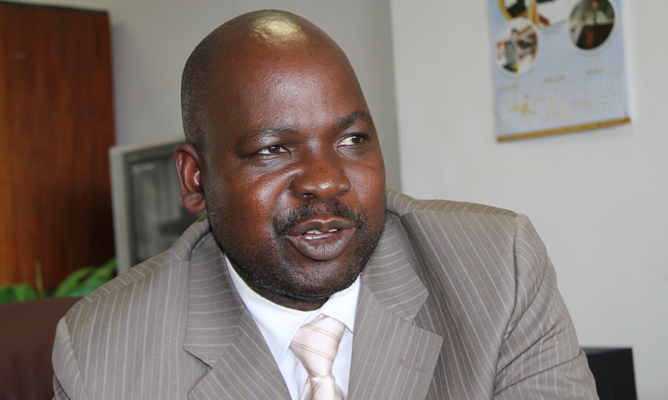THE process to select a new Prosecutor-General (PG) has run into controversy amid revelations that the short-listed candidates did not score basic minimum percentages or points required, sparking dismay in judicial circles.
A big debate has ensued among senior officials in the judiciary over whether the process should proceed or be nullified.
The Judicial Service Commission (JSC) last month publicly interviewed six candidates, namely acting PG Ray Goba, Wilson Manase, Charles Chinyama, Misheck Hogwe, Tecler Mapota and Florence Ziyambi.
The post fell vacant after President Robert Mugabe fired former PG Johannes Tomana in June for incompetence and misconduct.
The candidates, who are lawyers, were questioned about their pasts and issues to do with the National Prosecuting Authority (NPA).
According to sources in the judiciary, the JSC submitted the names of Hogwe, Manashe and Goba - in order of performance - to the Justice ministry for onward submission to Mugabe.
However, the sources said the short-listed candidates failed to get the required points and this has divided the JSC.
Moreover, the controversy is worsened by Goba's criminal record in Namibia where he was convicted of obstructing the course of justice in a traffic-related incident, while Manase was put under the spotlight over complaints filed with the Law Society of Zimbabwe (LSZ) by a client that he acted inappropriately by not paying what was due in an estate case. The LSZ fined Manase US$300.
The LSZ is also handling complaints against Manase raised by members of the Magamba Echimurenga Housing Scheme who in 2014 requested that he be investigated over the way he facilitated the change of ownership of Amsterdam Farm, on the outskirts of Harare. The matter was discussed during the interviews. To add to the confusion, there is also another purported short-list of "top-three" candidates circulating in judicial circles that includes deputy PG Ziyambi, Hogwe and Manase in that order.
Ziyambi, during the interviews, was questioned by the JSC over the role she could have played in stirring divisions and disharmony in the NPA.
Judicial sources told the Zimbabwe Independent this week that they fear the selection of the next PG could become a contentious issue just like the selection of the chief justice earlier this year as some officials want the process nullified.
"The argument in the judicial circles is that none of the interviewed candidates are suitable to be appointed PG because none of them managed to perform to maximum satisfaction and that their points were low. Goba, Hogwe and Manase scored below 60 marks. Their marks were between 50-59, yet the required score should be something above 70 marks," a judicial source said.
"However, the JSC forwarded the names to the Ministry of Justice who in turn forwarded the names of the short-listed three to President Mugabe. But now, there are moves to have the process nullified."
According to Section 259 (3) of the Constitution: "The Prosecutor-General is appointed by the President on the advice of the Judicial Service Commission following the procedure for the appointment of a judge."
While Section 180 (3) of the Constitution states that: "If the president considers that none of the persons on the list submitted to him or in terms of sub-section 2(e) are suitable for appointment to the office, he or she must require the Judicial Service Commission to submit a further list of three qualified persons whereupon the president must appoint one of the nominees to the office concerned."
Last year, the race to succeed the late former chief justice Godfrey Chidyausiku took a factional dimension after warring Zanu-PF factions, one led by Vice-President Emmerson Mnangagwa and G40 - a group of young Turks which has coalesced around First Lady Grace Mugabe - tried to prop up their preferred candidates.
Judge President George Chiweshe was Mnangagwa's preferred choice, given his strong links with the military, while Zimbabwe Electoral Commission (Zec) chair Justice Rita Makarau was preferred by G40.
However, after fierce legal battles, the then deputy chief justice Luke Malaba replaced Chidyausiku.
The National Assembly and Senate have controversially since passed the controversial Constitution Bill (No1) which gives the president sole powers to appoint the chief justice, his deputy and the judge president. The Bill was pushed by the Justice ministry, which is superintended by Mnangagwa, and was largely seen as a way to ensure Chiweshe is appointed without much scrutiny.
MDC-T MPs this week filed a constitutional court application seeking the nullification of the Bill, arguing that when the process was done the National Assembly and Senate were not fully constituted.
- the independent
 Concern over Masvingo black market
Concern over Masvingo black market  Kenya declares three days of mourning for Mugabe
Kenya declares three days of mourning for Mugabe  UK's Boris Johnson quits over Brexit stretegy
UK's Boris Johnson quits over Brexit stretegy  SecZim licences VFEX
SecZim licences VFEX  Zimbabwe abandons debt relief initiative
Zimbabwe abandons debt relief initiative  European Investment Bank warms up to Zimbabwe
European Investment Bank warms up to Zimbabwe  Young Investment Professional (YIP) Graduate Programme 2019
Young Investment Professional (YIP) Graduate Programme 2019 











 Young Investment Professional (YIP) Graduate Programme 2019
Young Investment Professional (YIP) Graduate Programme 2019
Editor's Pick